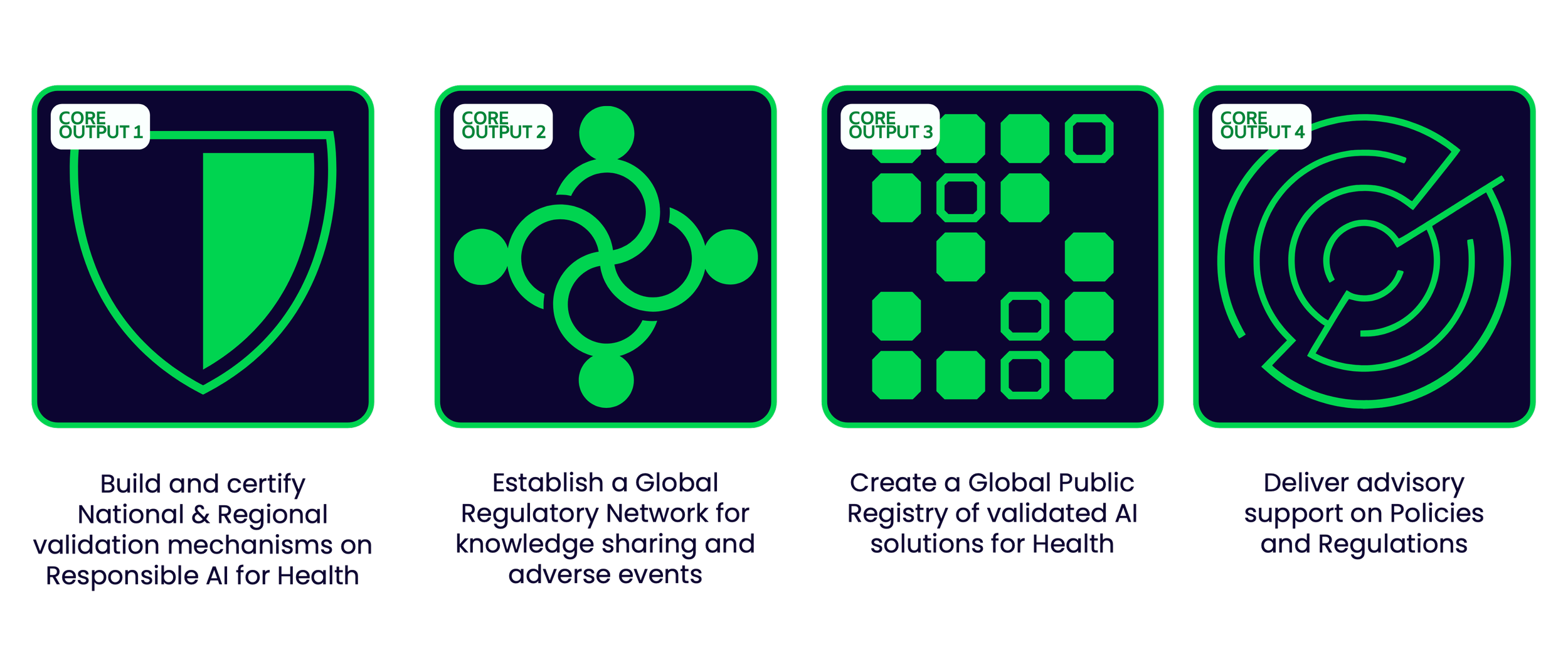Introducing HealthAI

HealthAI advances the governance and regulation of artificial intelligence to build trust, advance equity, and deliver on the potential of this emerging technology.
Four years ago, the International Digital Health and AI Research Collaborative (I-DAIR) was founded to strengthen collaborative, equitable research on the use of digital health and artificial intelligence (AI) in health systems around the world. Today, we are please to launch our new organizational strategy under our new identity: HealthAI.
A Process of Renewal
When I-DAIR was formed in 2019, the organization took an exploratory approach to define the gaps in the existing global digital health landscape and how our work could contribute to more equitable, impactful use of AI and digital health. Through pathfinder projects like the Global Research Maps, Trusted Research Infrastructure, and work on AI Governance, we gained important insights into the challenges and opportunities countries face when integrating these technologies into health systems and services.
During this time, we also saw unprecedented changes in the health and technology sectors. The COVID-19 pandemic greatly altered our lives as health systems stretched in response to this global crisis. Countries leaned on digital technologies to augment health services, and the importance of health data gained wide recognition. As the world continues to recover from the pandemic, health systems are primed for a new era of digital transformation.
Innovation in AI technologies has sparked new discourse on its potential benefits and risks. We have only begun to see how AI will alter health systems and services, and there is incredible momentum in the development of new use cases and AI-powered solutions. But we are still grappling with the ethical implications and risks to safety, security, and health that AI technologies pose. There is a growing need to proactively establish safeguards and standards that prioritize equity, health, and well-being.
As we began a review of our organizational strategy, it became clear that the organization needed to evolve in response to this changing context as well as the expressed needs of our partners and stakeholders. Through conversations and portfolio reviews, we refined our organizational mission, developed a new organizational strategy, and refreshed our organizational identity to more closely reflect the work we will do. While our name and logo may be different, our motivation remains the same:
A world where artificial intelligence produces equitable and inclusive improvements in health and well-being for all individuals and communities.
Promoting Responsible AI for Health
HealthAI’s strategy builds on the idea that strong regulatory mechanisms can establish necessary safeguards for and cultivate trust in AI-powered health technologies. As more of these technologies are developed, mechanisms are needed to ensure they are safe, comply with quality standards, and effectively deliver the intended health outcomes.
Through four core areas of work, HealthAI will promote the development and adoption of Responsible AI solutions in health through the collaborative implementation of regulatory mechanisms and global standards.

This strategy places countries at the center of regulatory processes, promoting flexible and contextually appropriate regulations informed by globally defined standards. Countries will drive the effective governance of AI in health, allowing regulatory processes to address the unique needs of a country’s population and promote the development and use of Responsible AI. With support from HealthAI, these regulatory mechanisms will not only conduct reviews of AI technologies, but will also manage processes for market authorization and reimbursement decisions. HealthAI will work with each mechanism to develop a business model that focuses on long-term sustainability and generates a new source of revenue for regulation.
HealthAI will support collaboration between countries through a global regulatory network. Countries will have a platform to share best practices, provide collective input to global stakeholders, and alert each other of adverse events related to AI technologies. By facilitating better information sharing between countries, HealthAI can help accelerate in-country approval processes, leading to cost savings and bureaucratic streamlining.
A global repository of validated solutions will consolidate the outputs of country-level regulatory mechanisms, creating a resource of validated AI health solutions. Countries will be able to identify technologies in use around the world and gain access to the findings of completed regulatory reviews.
HealthAI will also work with a wide range of partners, providing its expertise to organizations and companies involved in the development, implementation, and management of AI solutions. This advisory support will help entrench global standards of Responsible AI into the entire process of innovation and implementation.
These four components work together to support an enabling environment that capitalizes on the full potential of Responsible AI solutions to improve the health and well-being of all people.

Partnerships are Key
We are excited about our new strategy, but we cannot do it alone. We are building closer partnerships with partners of all kinds–from the World Health Organization to country governments and more. These partnerships will be key to developing regulatory tools, expanding the capacity of regulatory mechanisms, and advocating for the adoption of global standards.
We invite you to read more about our strategy and connect with us if you’d like to know more.
Reach Out to Us
We're here to help improve and we want to hear from you.
Got a question or an idea? Want to work with us? Fill out this form, and we'll get back to you quickly.
